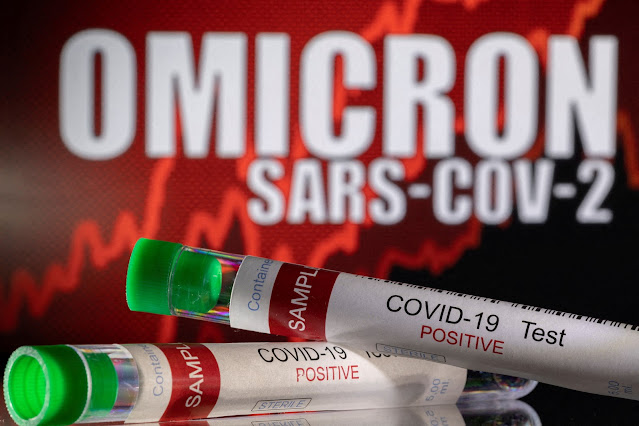Omicron symptoms: What unusual signs should you watch out for
Coronavirus or COVID-19 is an infectious disease caused by the SARS-CoV-2 virus. The first recorded case of COVID-19 was in December 2019 in Wuhan City, China. Outside of China, it was first recorded on 14 January 2020.
Since then, the virus has spread to every continent. By mid-March 2020, Europe
had reported over 40% of the global confirmed cases of COVID-19. In Africa, the
first case of COVID-19 was confirmed in Egypt on 14 February 2020.
Since then, the World Health Organisation (WHO) has
recorded 275,466,533 cases
worldwide with 5,361,332 deaths so far.
The first
wave
The first wave of the COVID-19 did not hit Africa as
rapidly as it did to the rest of the world. However, the second wave appeared
to be much more aggressive with many more cases being reported. As at 31st
December, 2020, Africa had reported 2, 763, 421 cases with 65 602 deaths
recorded.
The
second wave recorded more young people being affected as compared to previous
one which basically was more severe on the elderly and persons with underlying
conditions. There were more children and pregnant women reported to have been
hit by the virus.
To
keep the spread in check and to lower transmission, countries came up with safety precautions, such as getting vaccinated, appealing to
their people to practice physical social distancing, hand
washing and wearing of masks.
However, these efforts were affected and derailed by
various factors which included low vaccination rates especially in Africa as
well as defiance by the people to adhere to the COVID-19 safety precaution
measures.
The SARS-CoV-2 has also complicated matters through
various mutations that have resulted to different variants of the virus, one of
them being the delta variant, considered one of the most contagious variants so
far.
The delta variant has seemed resistant to vaccines even
though vaccines have been very effective at preventing serious illness,
hospitalisation and death from COVID-19.
The
Omicron variant
Then there is this new variant called the Omicron variant that
was first
discovered in Botswana in November 2021 and later in South Africa but has since
spread to more than a dozen countries.
It has
since spread rapidly around the world, being reported in 57 countries in the world, and is now dominant
in the UK and US.
The speed at which omicron is spreading is now
outpacing the also very contagious delta variant. It is now the most dominant strain in the US, accounting for
over 73% of new COVID-19 cases, less than three weeks after it was first
reported, with Delta making up an additional 26.6%.
This variant contains more than 30
mutations in the virus’ spike proteins, which allows it to penetrate and
infect cells. It is believed to spread more easily and that anyone with Omicron
infection can spread the virus to others, even if they are vaccinated or don’t
have symptoms.
The initial COVID-19 symptoms
included fever or chills, cough, shortness of breath or difficulty breathing,
headache, fatigue, sore throat, congestion or runny nose and loss of taste or
smell.
People infected with the Omicron variant however are
said to bear symptoms similar to those of cold or flu. They include headaches, body aches, fatigue that ranges from mild to
severe, runny nose, sneezing
and sore throat.
Researchers have warned that no one should ignore
symptoms such as a runny nose and
headache as they may be the first symptoms and only symptoms of COVID-19.
African scientists have stressed Omicron appears milder and none of the patients so far has been admitted to surgeries. Most of them are treated conservatively
at home.
Vaccines are said not to offer
as much protection against omicron as they have against previous variants of
the coronavirus but they still help a lot. South African researchers have
argued that vaccines lowered the risk of hospitalisation to 29 per cent for
the Omicron variant as compared to the first wave of the virus in mid-2020. Growing evidence
shows that people who have received two doses of the vaccine typically exhibit
less severe symptoms.
In conclusion
Omicron variant is believed to have claimed its first death in Texas United States, a man
aged between 50-60 years old and who was unvaccinated. The UK has reported seven deaths and 85 hospitalisations related to the
Omicron variant as of December 16, 2021.
Even though Omicron is highly transmissible, the Delta variant still remains the dominant force with
99% of COVID-19 cases globally. People need to get vaccinated or boosted to protect themselves and
others before they face greater chances of infection of these two variants
that are spreading across the nations so fast.










.png)
.png)

No comments: